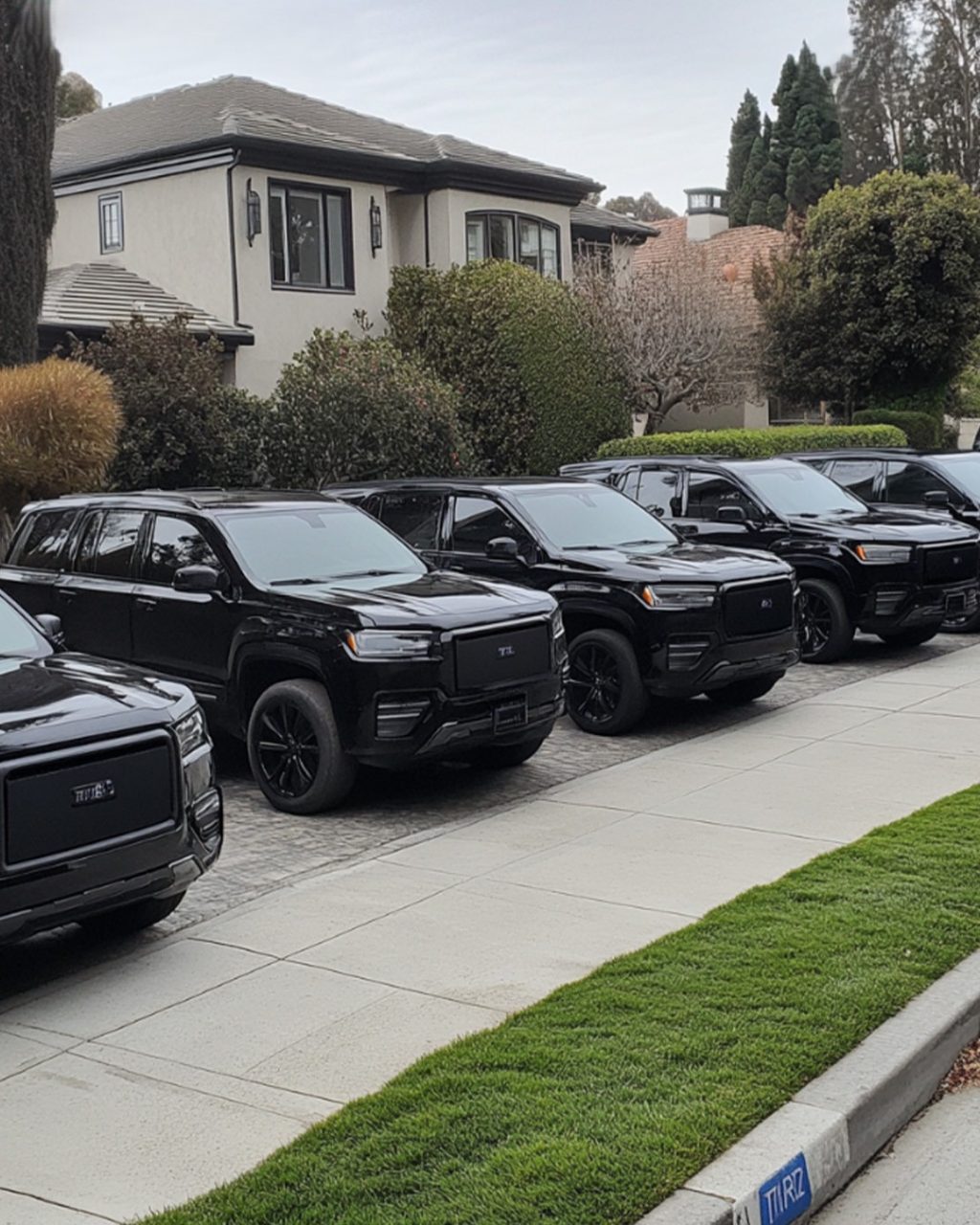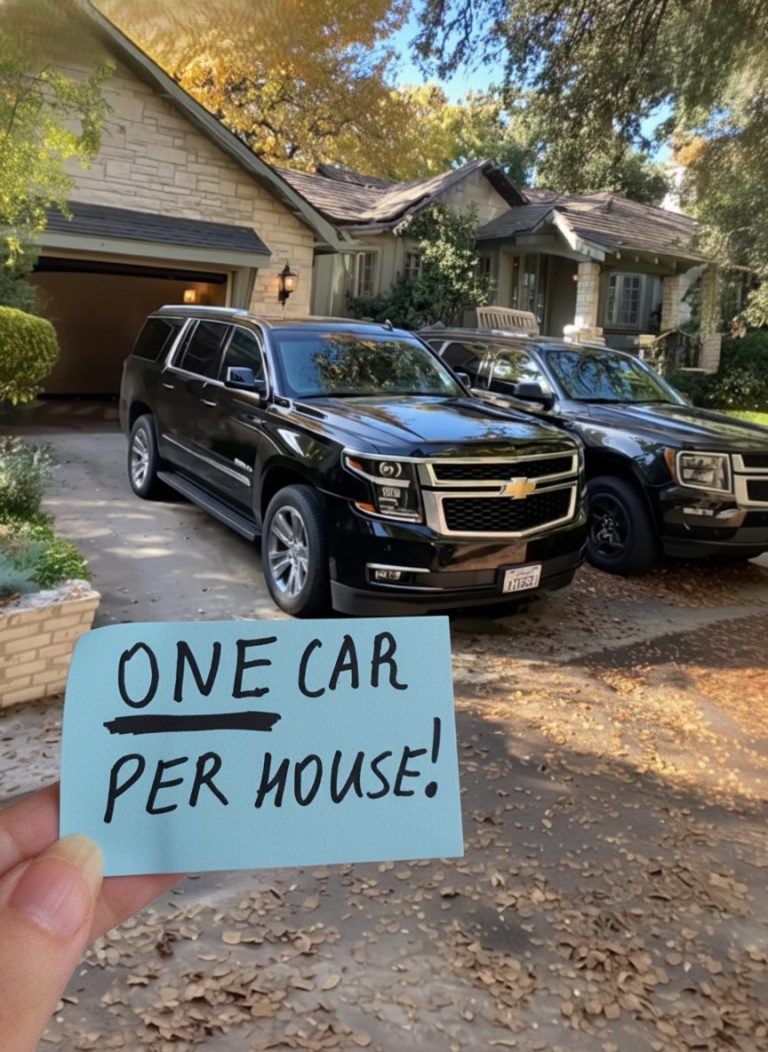
My mom died when I was ten.
Dad held it together for a few years, but when I was fourteen, he married her — Cheryl.
The woman who smiled too wide when people were watching and snapped too fast when they weren’t. She never raised a hand to me, but she never let me forget I wasn’t hers.
When Dad died of a sudden heart attack five years later — I was just nineteen — Cheryl didn’t even wait for the funeral flowers to wilt.
Two days later, she stood at the top of the stairs with her arms crossed and said,
“YOU’RE NOT FAMILY ANYMORE. GET OUT.”
No sympathy. No warmth. Just ice.
I left with a duffel bag and my guitar. That night, I crashed on my best friend’s couch, staring at the ceiling, wondering how grief could burn and freeze at the same time.
The next morning, I went back to take some more of my stuff. But when I came to the house I was raised in—the house built by my great-grandfather—there were five black SUVs parked outside.
My stomach dropped. I thought maybe Cheryl had called security to keep me away.
But when I rang the bell, the door creaked open and Cheryl looked like she’d seen death itself.
“Oh! You’re here!” she said, her voice suddenly syrupy. “I was just… just about to call you, sweetheart.”
I blinked. “What’s going on?”
She stepped aside and motioned for me to come in. The living room, once filled with warm photos of Mom and Dad, now looked staged—like a hotel lobby. Fresh flowers in vases. Polished furniture. But the tension in the air was thick enough to chew.
Seated on the couch were two men in crisp suits. One had a leather briefcase. The other had a pen in hand, flipping through a stack of documents.
“Is this the stepdaughter?” the one with the briefcase asked, glancing at me with polite indifference.
“She’s not my—” Cheryl started, but then stopped. Forced a grin. “Yes. This is her.”
“Perfect timing,” the man said. “Let’s begin.”
I looked at Cheryl. Her face was pale, her eyes twitching with the effort of faking calm.
“Begin what?” I asked.
The man with the pen looked up. “The reading of your father’s updated will.”
My heart stalled. “Updated?”
He nodded. “It was amended three months before his passing. You weren’t informed because the conditions stated it would be revealed only with all parties present.”
Cheryl had gone silent. Her fists were clenched so tight her knuckles had gone white.
I took a cautious seat. “What does it say?”
The man with the briefcase pulled out a folded envelope sealed with wax. He broke it carefully, unfolded the paper inside, and began reading:
“To my daughter: I know Cheryl will try to push you out. She thinks this house is hers. She’s wrong. This house was built by your great-grandfather, passed to my father, and now it belongs to you.
You’ll find the deed and all keys in the red lockbox in my closet.
As for Cheryl: I have provided her a small monthly allowance, contingent on her staying away from this home and from you. She was my mistake, and I’m sorry for the pain she’s caused.
Take back what is yours. Build a better future.”
The room was so quiet, I could hear Cheryl’s breath catch in her throat.
“You’re… you’re lying,” she hissed.
But the documents were real. Notarized. Signed. Witnessed.
I stood up slowly, heart racing, tears burning behind my eyes.
“I’m not going anywhere,” I said. “But you are.”
For the first time in five years, I felt like the ground was solid beneath my feet.
And for the first time in her life, Cheryl was the one with nowhere to go.
Cheryl stared at me like I’d slapped her. Her mouth opened and closed, searching for a comeback—but the men in suits had already begun packing up the documents. They weren’t interested in her tantrums.
“No. No, this isn’t fair!” she barked. “I took care of this house! I cooked, I cleaned—I was his wife!”
The man with the briefcase didn’t even flinch. “You were his legal spouse, yes. But the will is very clear: you are entitled to the monthly stipend and nothing else. If you choose to reject those terms, you get nothing.”
Cheryl looked like she might implode. Her eyes flashed toward the stairs—maybe considering what she could grab, what she could still take before leaving.
I stepped in her path.
“You already threw me out once,” I said, voice low but steady. “You don’t get to touch anything else that belongs to this family.”
Her eyes narrowed, but I didn’t move.
“You think this changes anything?” she spat. “You’ll be alone in this big, empty house, just like your father. Just like your mother left you.”
That one hit like a punch. But I didn’t let it show.
“No,” I said softly. “Because I have what you never had, Cheryl. Roots. This house is part of who I am. You were just passing through.”
The lawyer cleared his throat politely. “We can arrange for movers to escort Mrs. Cheryl’s things out within the next 48 hours.”
Cheryl looked like she might argue again, but then she caught my eyes—unflinching, unmoved—and I think, in that moment, she finally realized she had lost.
She walked upstairs slowly, like a ghost.
I didn’t follow. I went to Dad’s closet. My fingers trembled as I pulled out the red lockbox.
Inside was the deed. The keys. And a small, yellowed photograph of me as a toddler on his shoulders—Mom beside us, laughing.
Behind it was a note.
“I knew you’d come back.
I’m sorry I couldn’t protect you from her. But now, this house—our legacy—is yours.
Make it a place full of love again.
— Dad.”
I sat on the floor and cried.
Not because I was sad.
Because I had finally come home.
The house was quiet now. Cheryl had packed what little she was entitled to and vanished without another word. The air felt different—lighter, like the walls could breathe again.
For the first few days, I wandered from room to room, remembering where things used to be. The spot in the hallway where Mom hung her aprons. Dad’s favorite chair by the window that always got the afternoon sun. The creak on the third stair I used to skip, trying not to wake them when I came home late.
Grief is strange. It softens and sharpens at the same time.
I started small—cleaning, organizing, pulling old sheets off furniture. I found some of Mom’s journals hidden behind a loose panel in her closet. Pages and pages of her handwriting… dreams, recipes, little moments she’d scribbled down after long days. Reading them made me feel like she was still here, whispering memories into my ear.
Then one rainy Saturday, there was a knock at the door.
I wasn’t expecting anyone.
I opened it to find my sister, Grace, standing on the porch with a soaked suitcase and red eyes.
She looked like she’d been crying for hours. “I got the letter,” she whispered. “Cheryl tried to keep it from me, but a lawyer found me.”
I pulled her inside without another word.
We sat on the couch, the same one where we used to make blanket forts and fight over cartoons. For the first time in years, we talked—really talked. About Mom. About Dad. About the pain we’d both carried separately, thinking we were alone in it.
“I should’ve never let Cheryl push me away,” she said quietly. “I was scared. Angry. But I missed you.”
“I missed you too,” I told her. “We still have time.”
And we did.
In the weeks that followed, we turned the house into a home again. Grace moved into her old room. I kept Dad’s study, now filled with the scent of old books and fresh flowers. We painted, donated the furniture Cheryl had bought, and filled the walls with photographs from better days.
One night, while going through a trunk in the attic, we found a stack of unopened birthday cards addressed to us—cards Dad had hidden after Cheryl insisted we “didn’t deserve gifts anymore.” Grace sobbed. I held her.
We were healing.
Together.
And that old house, once filled with silence and sorrow, began to feel alive again.
A place built by our great-grandfather… now reborn with laughter, music, and the warmth of people who truly belonged.




1 thought on “My Stepmother Kicked Me Out Two Days After My Father Died – The Next Morning, a Bunch of SUVs Showed up in Front of Her House”